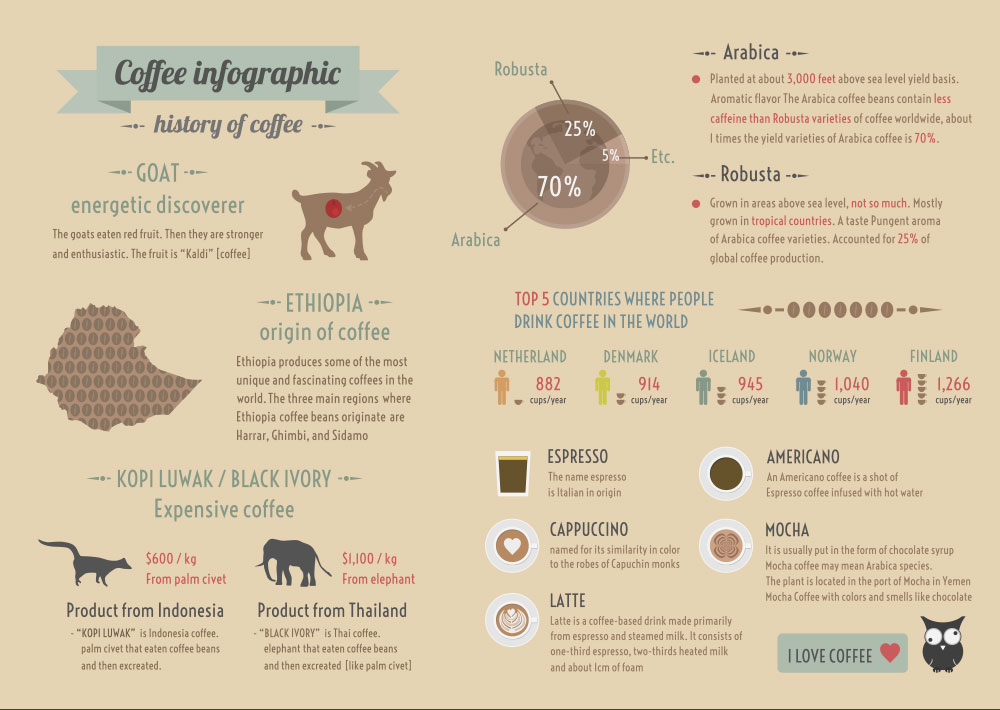Uncover the extraordinary journey of coffee from ancient Ethiopian forests to your morning cup in our latest blog post. Dive into the intriguing tales of its discovery, the birth of coffee houses, and how it shaped cultures worldwide.
Coffee, a beverage savored by millions around the world, has a rich and intriguing history that dates back centuries. Its journey from ancient rituals to a global obsession is a story that intertwines with the cultures, economies, and politics of various societies. In this blog post, we’ll explore the fascinating history of coffee, tracing its roots and understanding how it became the world-renowned drink it is today.
The Origins of Coffee
The story of coffee begins in the ancient coffee forests of the Ethiopian plateau. Legend has it that a goat herder named Kaldi first discovered the potential of these beloved beans. The story goes that Kaldi noticed his goats becoming unusually energetic after eating berries from a certain tree. Curious, Kaldi tried the berries himself and experienced a similar exhilaration. Monks at a nearby monastery heard about this discovery and began using the berries to keep them awake during long hours of prayer. They boiled the berries in water, creating the first primitive version of the coffee we know today.
Coffee Spreads Across the Globe
From Ethiopia, coffee spread to Yemen in the 15th century, where it was first cultivated on a large scale. The port city of Mocha in Yemen became a significant trading center for coffee, giving rise to the term ‘Mocha’ often used for chocolatey coffee drinks. By the 16th century, coffee had reached the rest of the Middle East, Persia, Turkey, and North Africa, becoming an integral part of the culture. Coffee houses, known as ‘qahveh khaneh’, began to appear in cities across the Near East. These establishments became hubs for social activities, political discussions, and even live music and poetry readings.
Coffee in Europe: Controversy and Popularity
Coffee arrived in Europe around the 17th century, initially received with suspicion and fear. Some called it the “bitter invention of Satan” due to its stimulating effects. However, with the endorsement of Pope Clement VIII, who enjoyed its flavor, coffee quickly became popular across the continent. Coffee houses sprang up in major cities – they were often referred to as ‘penny universities’ in England, as for a penny one could buy a cup of coffee and engage in stimulating conversations.
The Birth of the Coffee Plantations
As demand for coffee grew in Europe, so did the desire to cultivate it outside of Arabia. In the 17th century, the Dutch succeeded in obtaining coffee seedlings, leading to the establishment of coffee plantations in Ceylon (now Sri Lanka) and Java (a part of modern-day Indonesia). This was the beginning of the spread of coffee cultivation to other parts of the world, including the Caribbean, South America, and Africa.
Coffee in the Americas
The history of coffee in the Americas is particularly significant. In the 18th century, coffee arrived in Brazil, and by the 19th century, the country had become the world’s largest producer, a title it still holds today. The growth of coffee plantations in the Americas was unfortunately intertwined with the dark history of colonialism and slavery.

Innovation and the Modern Age of Coffee
The 19th and 20th centuries brought significant innovations in coffee production and consumption. The invention of espresso in Italy in the early 20th century revolutionized the way we enjoy coffee, leading to the creation of a variety of coffee drinks like cappuccinos and lattes. During the same period, instant coffee was invented, making it easier for people to enjoy coffee without the need for brewing equipment.
The Rise of Specialty Coffee
In the late 20th and early 21st centuries, we witnessed the rise of specialty coffee. This movement emphasizes the quality of coffee beans, the art of brewing, and the experience of coffee consumption. It also focuses on sustainability and fair trade practices, ensuring that coffee production supports the well-being of farmers and the environment.
Coffee and Culture
Coffee is not just a beverage; it’s a cultural phenomenon. It plays a central role in many social rituals around the world. In Ethiopia, the birthplace of coffee, traditional coffee ceremonies are still a vital part of the social fabric. In Italy, espresso bars are an integral part of daily life, and in the United States, coffee shops serve as popular meeting spots for work and leisure.
The history of coffee is as rich and complex as the beverage itself. From its origins in Ethiopia to its global spread, coffee has influenced economies, cultures, and lifestyles across the world. Today, it continues to evolve, with new trends and innovations constantly emerging. As we sip our morning cup of coffee, we partake in a tradition that spans centuries and continents, a testament to coffee’s enduring appeal and significance.
